5 may 2015
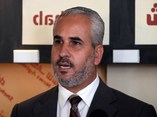
Islamic Resistance Movement, Hamas, said the threats made by Israeli chief of staff Benny Gantz affirm Israel’s intentions to continue its crimes against the Palestinian people as well as peoples of the region.
Hamas spokesman Fawzi Barhoum said, in a press statement on Tuesday, that Gantz’s threats of destroying kindergartens, mosques and civilians houses in each of Gaza, and Lebanon and admitting with pride the endorsement of bombing al-Wafa Hospital in Gaza confirm Israel’s intention to continue its crimes.
Barhoum asked the international community to intervene to protect the Palestinian people from Israeli crimes and massacres. He called on the international community to make firm decisions against Israeli leaders and to work hard on prosecuting them at the International Criminal Court (ICC).
Earlier yesterday day, war criminal Gantz warned that “the next round of violence will be worse and see this suffering increase," stating that IDF will target mosques, houses, and even kindergartens under the false pretext that they are used to store weapons.
Hamas spokesman Fawzi Barhoum said, in a press statement on Tuesday, that Gantz’s threats of destroying kindergartens, mosques and civilians houses in each of Gaza, and Lebanon and admitting with pride the endorsement of bombing al-Wafa Hospital in Gaza confirm Israel’s intention to continue its crimes.
Barhoum asked the international community to intervene to protect the Palestinian people from Israeli crimes and massacres. He called on the international community to make firm decisions against Israeli leaders and to work hard on prosecuting them at the International Criminal Court (ICC).
Earlier yesterday day, war criminal Gantz warned that “the next round of violence will be worse and see this suffering increase," stating that IDF will target mosques, houses, and even kindergartens under the false pretext that they are used to store weapons.

The Israeli Occupation Forces (IOF) nabbed at dawn Tuesday four Palestinians including three secondary school teachers from different parts of Nablus city.
Local sources told PIC reporter that secondary school teacher Khaldoun Assida, who served time in Israeli jails, was re-arrested Tuesday morning from his home in al-Tel town to the west of the city.
The 21-year-old Ayham Harbi was also detained at late hours yesterday when Israeli forces brutally stormed a barber shop in Aanbos town south of Nablus. Ayham was severely attacked and beaten during the arrest.
A second secondary school teacher was nabbed when Israeli forces violently broke into his home in Aqrba town.
Also in Nablus, IOF arrested ex-detainee Mohamed Jawda after confiscating his mobile phone and computer. Jawda who works as a teacher in a local secondary school in Kablan town was arrested several times in Israeli jails.
Along the same line, IOF deployed in large numbers throughout Hawara town to the south of the city and forcibly closed the local shops.
Local sources told PIC reporter that secondary school teacher Khaldoun Assida, who served time in Israeli jails, was re-arrested Tuesday morning from his home in al-Tel town to the west of the city.
The 21-year-old Ayham Harbi was also detained at late hours yesterday when Israeli forces brutally stormed a barber shop in Aanbos town south of Nablus. Ayham was severely attacked and beaten during the arrest.
A second secondary school teacher was nabbed when Israeli forces violently broke into his home in Aqrba town.
Also in Nablus, IOF arrested ex-detainee Mohamed Jawda after confiscating his mobile phone and computer. Jawda who works as a teacher in a local secondary school in Kablan town was arrested several times in Israeli jails.
Along the same line, IOF deployed in large numbers throughout Hawara town to the south of the city and forcibly closed the local shops.
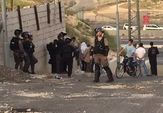
Israeli soldiers placed, Monday, concrete blocks surrounding a Palestinian land Israel intends to illegally confiscate, in Silwan town, in occupied Jerusalem, leading to clashes between the army and local youths.
Member of the Follow-Up Committee in Silwan, Mohammad Abu al-Hummus, stated that several military vehicles invaded the town, before the soldiers started placing concrete blocks around more than a Dunam of Palestinian land.
He said Israel wants to use the land for a project belonging to the Hadassah Hospital, and that “placing the concrete blocks seems to be a preemptive measure to foil appeals filed by the residents against the decision.”
Abu al-Hummus added that the land in question is more than a Dunam (0.247 Acres) that Israel decided to confiscate in the 1970’s for “public use,” but started in recent years attempting to use it for the benefit of the medical center.
The invasion, and placing the concrete blocks, led to clashes between dozens of local youths and the Israeli soldiers; no injuries were reported.
The clashes largely took place near the main entrance of the town, while dozens of soldiers surrounded it.
Member of the Follow-Up Committee in Silwan, Mohammad Abu al-Hummus, stated that several military vehicles invaded the town, before the soldiers started placing concrete blocks around more than a Dunam of Palestinian land.
He said Israel wants to use the land for a project belonging to the Hadassah Hospital, and that “placing the concrete blocks seems to be a preemptive measure to foil appeals filed by the residents against the decision.”
Abu al-Hummus added that the land in question is more than a Dunam (0.247 Acres) that Israel decided to confiscate in the 1970’s for “public use,” but started in recent years attempting to use it for the benefit of the medical center.
The invasion, and placing the concrete blocks, led to clashes between dozens of local youths and the Israeli soldiers; no injuries were reported.
The clashes largely took place near the main entrance of the town, while dozens of soldiers surrounded it.
4 may 2015
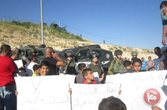
Israeli forces have sealed the main entrance to the East Jerusalem neighborhood of al-Zaayyem, "locking up more than 6,000 Palestinians in a large prison," local residents say.
An iron gate set up by Israeli forces has been completely closed for ten days, head of al-Zaayyem local council Naim Sub Labantold Ma'an News Agency, on Monday.
Israeli forces first set up the gate near a military checkpoint at the main entrance to al-Zaayyem in late March, citing security concerns.
The soldiers have controlled the gate since then, Sub Laban said, opening and closing it whenever they want to restrict the movement of schoolchildren, businessmen and others who need to go in and out every day.
Sub Laban added that Israeli forces had opened the gate for several hours on Sunday afternoon, and again for two hours on Monday morning, but that otherwise the gate had been closed for ten days.
When the gate is closed, residents of the neighborhood, who have described the closure as "collective punishment" are forced to use an alternative route of dirt roads about five kilometers long.
When the gate was first set up, Israeli authorities claimed it would remain open all the time "except when there is a dangerous security situation," Sub Laban said.
Abu Mahmoud Shweiki, an ice cream distributor who sells to stores in al-Zaayyem, said that he now has to drive his truck over a long dirt road every day in order to load and unload his goods.
Schoolchildren also said that they have been forced to walk a long route along dirt roads in order to reach their schools every day.
An iron gate set up by Israeli forces has been completely closed for ten days, head of al-Zaayyem local council Naim Sub Labantold Ma'an News Agency, on Monday.
Israeli forces first set up the gate near a military checkpoint at the main entrance to al-Zaayyem in late March, citing security concerns.
The soldiers have controlled the gate since then, Sub Laban said, opening and closing it whenever they want to restrict the movement of schoolchildren, businessmen and others who need to go in and out every day.
Sub Laban added that Israeli forces had opened the gate for several hours on Sunday afternoon, and again for two hours on Monday morning, but that otherwise the gate had been closed for ten days.
When the gate is closed, residents of the neighborhood, who have described the closure as "collective punishment" are forced to use an alternative route of dirt roads about five kilometers long.
When the gate was first set up, Israeli authorities claimed it would remain open all the time "except when there is a dangerous security situation," Sub Laban said.
Abu Mahmoud Shweiki, an ice cream distributor who sells to stores in al-Zaayyem, said that he now has to drive his truck over a long dirt road every day in order to load and unload his goods.
Schoolchildren also said that they have been forced to walk a long route along dirt roads in order to reach their schools every day.

Fire erupted in a northern Jordan Valley grazing land, on Monday, after Israeli army embarked on live ammunition military training in the area, according to a local official.
Aref Daraghmeh, head of Wadi al-Maleh village council, told WAFA Palestinian News & Info Agency that fire engulfed large tracts of pastures used for grazing animals. He said the army denied locals from accessing their land to put out the fire.
Only yesterday, Israeli military drills near Nablus caused significant damage to hundreds of dunums of Palestinian-owned land.
On May 1, Jordan Valley Solidarity, a network of Palestinian grassroots community groups, petitioned to the UN, international embassies and international NGOs to pressure Israel to stop its regular military exercises in the northern Jordan Valley.
“This training will devastate the communities of Humsa Fouqa, Ibziq and Ras ar Ahmar and all of the surrounding area once again,” said the group.
Israel is planning to annex the Jordan Valley into a completely Israeli area, primarily in agriculture, targeting to ban territorial contiguity between a future Palestinian state and the rest of the Arab world.
Last May, a senior Israeli commander admitted that training exercises in the occupied West Bank involve live fire and are used to drive local Palestinian residents off their land.
Israeli Colonel Einav Shalev, an operations officer in the Israeli military’s central command, admitted using the tactic during a subcommittee meeting of Israel’s parliament in April 2014.
The revelation was a rare official acknowledgement of a measure that critics have long decried as part of a deliberate policy by the Israeli authorities to force Palestinians out of their land.
Aref Daraghmeh, head of Wadi al-Maleh village council, told WAFA Palestinian News & Info Agency that fire engulfed large tracts of pastures used for grazing animals. He said the army denied locals from accessing their land to put out the fire.
Only yesterday, Israeli military drills near Nablus caused significant damage to hundreds of dunums of Palestinian-owned land.
On May 1, Jordan Valley Solidarity, a network of Palestinian grassroots community groups, petitioned to the UN, international embassies and international NGOs to pressure Israel to stop its regular military exercises in the northern Jordan Valley.
“This training will devastate the communities of Humsa Fouqa, Ibziq and Ras ar Ahmar and all of the surrounding area once again,” said the group.
Israel is planning to annex the Jordan Valley into a completely Israeli area, primarily in agriculture, targeting to ban territorial contiguity between a future Palestinian state and the rest of the Arab world.
Last May, a senior Israeli commander admitted that training exercises in the occupied West Bank involve live fire and are used to drive local Palestinian residents off their land.
Israeli Colonel Einav Shalev, an operations officer in the Israeli military’s central command, admitted using the tactic during a subcommittee meeting of Israel’s parliament in April 2014.
The revelation was a rare official acknowledgement of a measure that critics have long decried as part of a deliberate policy by the Israeli authorities to force Palestinians out of their land.

Israeli Occupation Forces (IOF) stormed on Monday the houses of Palestinians in al-Aroub refugee camp to the north of al-Khalil.
Local sources told the PIC reporter that the IOF stormed the houses while soldiers were deployed in houses’ rooftops as well as in the camp’s neighborhoods. No arrests were reported.
The sources added that the IOF patrols roamed the streets of the camp and retreated shortly before dawn hours. The Israeli forces intensified its presence near the military tower before raiding the camp, the sources added.
Local sources told the PIC reporter that the IOF stormed the houses while soldiers were deployed in houses’ rooftops as well as in the camp’s neighborhoods. No arrests were reported.
The sources added that the IOF patrols roamed the streets of the camp and retreated shortly before dawn hours. The Israeli forces intensified its presence near the military tower before raiding the camp, the sources added.
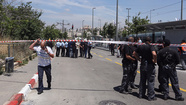
Guards shot Palestinian in the legs after one said he had been attacked from behind; no weapon found at scene of incident.
Security guards at a light rail station in Jerusalem on late Monday morning shot a Palestinian man suspected of trying to attack one of them.
The Palestinian was shot in the legs during the incident at the station at Givat Hamivtar, near the French Hill neighborhood. There were no other injuries.
During a preliminary investigation of the incident, one of the security guards said he had been attacked from behind by the Palestinian, but had not known whether he had been punched or hit with a weapon.
His fellow guards said that the man had tried to pull something out of his pocket, which they suspected was a knife, at which point they shot at his legs. No knife has been found at the scene. Searches of the area continued after the incident and an investigation has been launched.
The Palestinian was taken to Hadassah University Hospital, Ein Karem, in moderate condition.
Daniel, a student at the nearby yeshiva, told Ynet that he did not see a knife during the incident.
"The guard seemed very upset and told police investigators that 'the Palestinian was trying to get something out of his pocket and attack. I fired in the air. I asked him to stop and then I fired at his legs.'"
Fellow yeshiva student Simi Saada said: "We heard shots and arrived at the scene within 30 seconds. There was a Palestinian who had been shot on the street and police officers and rescue personnel around him treating him. The security guard seemed in shock and was sitting to the side."
The light rail returned to normal schedule after the incident, but did not stop at the Givat Hamivtar station.
Local residents have complained about the lack of police in the area. Yosef Cohen, who lives in Givat Hamivtar, an area in which there have been a string of attacks in the past two years. "We call this the blood route. People are afraid to walk about; we lock our doors out of fear. The police have reduced their numbers recently and we don’t feel safe. There are Palestinians here who threaten us."
There has been a wave of terror attacks in Jerusalem In recent weeks, including a deadly vehicular attack that claimed the life of Shalom Cherki and left his companion Shira Klein in serious condition.
Two weeks later, a 16-year-old Palestinian was shot dead after he tried to stab Border Police officers at the checkpoint next to Ma'ale Adumim. A day after, four police officers were run over in an attack close to the Mount of Olives.
Security guards at a light rail station in Jerusalem on late Monday morning shot a Palestinian man suspected of trying to attack one of them.
The Palestinian was shot in the legs during the incident at the station at Givat Hamivtar, near the French Hill neighborhood. There were no other injuries.
During a preliminary investigation of the incident, one of the security guards said he had been attacked from behind by the Palestinian, but had not known whether he had been punched or hit with a weapon.
His fellow guards said that the man had tried to pull something out of his pocket, which they suspected was a knife, at which point they shot at his legs. No knife has been found at the scene. Searches of the area continued after the incident and an investigation has been launched.
The Palestinian was taken to Hadassah University Hospital, Ein Karem, in moderate condition.
Daniel, a student at the nearby yeshiva, told Ynet that he did not see a knife during the incident.
"The guard seemed very upset and told police investigators that 'the Palestinian was trying to get something out of his pocket and attack. I fired in the air. I asked him to stop and then I fired at his legs.'"
Fellow yeshiva student Simi Saada said: "We heard shots and arrived at the scene within 30 seconds. There was a Palestinian who had been shot on the street and police officers and rescue personnel around him treating him. The security guard seemed in shock and was sitting to the side."
The light rail returned to normal schedule after the incident, but did not stop at the Givat Hamivtar station.
Local residents have complained about the lack of police in the area. Yosef Cohen, who lives in Givat Hamivtar, an area in which there have been a string of attacks in the past two years. "We call this the blood route. People are afraid to walk about; we lock our doors out of fear. The police have reduced their numbers recently and we don’t feel safe. There are Palestinians here who threaten us."
There has been a wave of terror attacks in Jerusalem In recent weeks, including a deadly vehicular attack that claimed the life of Shalom Cherki and left his companion Shira Klein in serious condition.
Two weeks later, a 16-year-old Palestinian was shot dead after he tried to stab Border Police officers at the checkpoint next to Ma'ale Adumim. A day after, four police officers were run over in an attack close to the Mount of Olives.
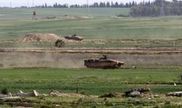
A number of armored Israeli military vehicles and bulldozers, conducted on Monday morning a limited invasion into Jabalia town, in the northern part of the Gaza Strip, and uprooted farmlands.
Media sources in Gaza said at least six armored D9 military bulldozers, and several armored vehicles, advanced into northern Gaza for a distance of approximately 100 meters.
The bulldozes then started uprooting and bulldozing agricultural lands, close to the border fence, and used smoke bombs to mask their vehicles while operating in northern Gaza.
The soldiers also advanced into the eastern side of Beit Hanoun nearby town, and fired several rounds of live ammunition to force the residents out of their lands.
In related news, soldiers fired live rounds on a number of farmers while in their lands, east of Khan Younis, in the southern part of the Gaza Strip.
On Sunday night after midnight, soldiers patrolled various areas across the border fence, and fired several flares while drones flew overhead.
The army conducts daily limited invasion in the coastal region, especially in Rafah and Khan Younis, in addition to the ongoing assaults against Gaza fishers and the boats.
Media sources in Gaza said at least six armored D9 military bulldozers, and several armored vehicles, advanced into northern Gaza for a distance of approximately 100 meters.
The bulldozes then started uprooting and bulldozing agricultural lands, close to the border fence, and used smoke bombs to mask their vehicles while operating in northern Gaza.
The soldiers also advanced into the eastern side of Beit Hanoun nearby town, and fired several rounds of live ammunition to force the residents out of their lands.
In related news, soldiers fired live rounds on a number of farmers while in their lands, east of Khan Younis, in the southern part of the Gaza Strip.
On Sunday night after midnight, soldiers patrolled various areas across the border fence, and fired several flares while drones flew overhead.
The army conducts daily limited invasion in the coastal region, especially in Rafah and Khan Younis, in addition to the ongoing assaults against Gaza fishers and the boats.
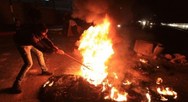
A Palestinian youngster at dawn Monday sustained rubber bullet injuries after he was shot by the Israeli occupation forces (IOF) in the spate of clashes that rocked Beit Furik town, in the West Bank city of Nablus.
A drove of Israeli army jeeps rolled into Nablus’ eastern town of Beit Furik at predawn time and scoured scores of Palestinian family homes, generating a state of panic among children and women, eye-witnesses told a PIC reporter.
Violent confrontations flared up in Dar al-Hassan neighborhood, in Beit Furik, where the IOF targeted the Palestinian unarmed protestors with randomly-shot volleys of rubber bullets and tear gas grenades.
A Palestinian youth sustained wounds in the process while a line of cars parked in front of civilian homes were remarkably damaged.
A drove of Israeli army jeeps rolled into Nablus’ eastern town of Beit Furik at predawn time and scoured scores of Palestinian family homes, generating a state of panic among children and women, eye-witnesses told a PIC reporter.
Violent confrontations flared up in Dar al-Hassan neighborhood, in Beit Furik, where the IOF targeted the Palestinian unarmed protestors with randomly-shot volleys of rubber bullets and tear gas grenades.
A Palestinian youth sustained wounds in the process while a line of cars parked in front of civilian homes were remarkably damaged.
3 may 2015
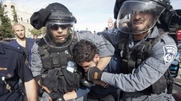
Israeli authorities, on Sunday, kidnapped six Palestinians in East Jerusalem, including two minors, and three others in the West Bank, most of them during predawn and night raids, during which several Palestinians were assaulted.
According to WAFA Palestinian News & Info Agency, Israeli police stormed the neighborhood of Ras al-Amoud, in Jerusalem, where they detained Izzeddine Barbar, age 17, after raiding his family’s home and breaking down the door.
Police also raided the neighborhood of Silwan, where they abducted Mohammad Asaliya, 21, and his brother Hamza, 17. Police assaulted members of their family during the arrest raid, according to Jerusalem Prisoners’ Families Committee.
Meanwhile, a police contingent stormed a house in the town of Anata, east of Jerusalem, and took 24-year-old Mohammad Esaeed after assaulting his entire family, including his minor brother Tareq.
Police also stormed the neighborhood of al-Tour, where they took Saeed Abul-Hawa, 23, and Basel Sayyad, 24.
Meanwhile, police arrested two Palestinians from Bethlehem while they were at their workplaces in Jerusalem, under the pretext of not having entry permits.
In Hebron, the Israeli army broke into the city and raided a money exchange shop. The army additionally stormed the nearby town of Dura, where they kidnapped a local resident after raiding and wreaking havoc in his home . He was identified as Alaa Rbei’i.
According to WAFA Palestinian News & Info Agency, Israeli police stormed the neighborhood of Ras al-Amoud, in Jerusalem, where they detained Izzeddine Barbar, age 17, after raiding his family’s home and breaking down the door.
Police also raided the neighborhood of Silwan, where they abducted Mohammad Asaliya, 21, and his brother Hamza, 17. Police assaulted members of their family during the arrest raid, according to Jerusalem Prisoners’ Families Committee.
Meanwhile, a police contingent stormed a house in the town of Anata, east of Jerusalem, and took 24-year-old Mohammad Esaeed after assaulting his entire family, including his minor brother Tareq.
Police also stormed the neighborhood of al-Tour, where they took Saeed Abul-Hawa, 23, and Basel Sayyad, 24.
Meanwhile, police arrested two Palestinians from Bethlehem while they were at their workplaces in Jerusalem, under the pretext of not having entry permits.
In Hebron, the Israeli army broke into the city and raided a money exchange shop. The army additionally stormed the nearby town of Dura, where they kidnapped a local resident after raiding and wreaking havoc in his home . He was identified as Alaa Rbei’i.
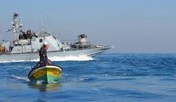
Israeli navy gunboats opened machinegun fire at Palestinians’ fishing boats in Gaza sea on Sunday morning with no casualties reported.
Local sources reported that a number of Israeli navy gunboats fired in the morning hours at the Palestinian fishing boats which were sailing in the northern Gaza sea.
The heavy shooting forced the Gazan fishermen to leave the sea and end fishing, the sources added.
The attack is another episode in the series of Israeli daily violations of the Cairo-brokered truce accord signed in the wake of last summer’s offensive on the besieged coastal enclave, which killed over 2,300 Palestinians, mostly civilians.
Local sources reported that a number of Israeli navy gunboats fired in the morning hours at the Palestinian fishing boats which were sailing in the northern Gaza sea.
The heavy shooting forced the Gazan fishermen to leave the sea and end fishing, the sources added.
The attack is another episode in the series of Israeli daily violations of the Cairo-brokered truce accord signed in the wake of last summer’s offensive on the besieged coastal enclave, which killed over 2,300 Palestinians, mostly civilians.
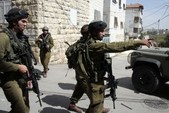
The Israeli occupation forces (IOF) at dawn Sunday broke into local offices for currency exchange in the West Bank city of al-Khalil and grabbed hold of money and other properties.
A drove of Israeli army jeeps rolled into al-Khalil City at the crack of dawn and stormed the local offices of the Abdine agencies for currency exchange in Ein Sara, Al-Salam Street, Bab al-Zaouia, Douar al-Manara and al-Haras, bystanders at the scene told a PIC journalist.
The invading IOF troops further dragged the offices’ owner, Fdhl al-Abdine, out of his family home and forced him to unbolt the entrance doors moments before they held sway over important documents, laptops, and hard cash.
A similar assault by the IOF cropped up last June on allegations of chasing down the youngsters Amer Abu Eisha and Marwan al-Qawasmi following the disappearance of three Israeli soldiers from al-Khalil.
A drove of Israeli army jeeps rolled into al-Khalil City at the crack of dawn and stormed the local offices of the Abdine agencies for currency exchange in Ein Sara, Al-Salam Street, Bab al-Zaouia, Douar al-Manara and al-Haras, bystanders at the scene told a PIC journalist.
The invading IOF troops further dragged the offices’ owner, Fdhl al-Abdine, out of his family home and forced him to unbolt the entrance doors moments before they held sway over important documents, laptops, and hard cash.
A similar assault by the IOF cropped up last June on allegations of chasing down the youngsters Amer Abu Eisha and Marwan al-Qawasmi following the disappearance of three Israeli soldiers from al-Khalil.
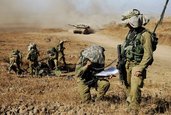
Israeli occupation forces on Sunday morning have sabotaged hundreds of dunums of agricultural lands in Khirbet Tawil east Nablus, using military crawlers.
Local sources said that Israeli forces have sabotaged these lands, following a military drill which took place there.
Their crawlers and machines were brought in to Nablus since last week in preparation.
Israeli Forces Raid Agricultural Lands in Khirbet al-Tawil
Israeli forces, Sunday morning, sabotaged hundreds of dunams of agricultural lands in Khirbet al-Tawil, east of Nablus, using military crawlers.
According to the PNN, local sources said that Israeli forces have sabotaged these lands, following a military drill which took place there.
Their crawlers and machines were brought in to Nablus since last week in preparation.
Al Ray further reported that a member of the Popular Committee Against the Wall and Settlements, Yousef Dereya, said that Israeli forces mobilized over 60 tanks in the area, a week ago.
He explained that Palestinian civilians in Khirbet al-Tawil woke up to the sounds of heavy gun fire, causing extreme panic.
Local sources said that Israeli forces have sabotaged these lands, following a military drill which took place there.
Their crawlers and machines were brought in to Nablus since last week in preparation.
Israeli Forces Raid Agricultural Lands in Khirbet al-Tawil
Israeli forces, Sunday morning, sabotaged hundreds of dunams of agricultural lands in Khirbet al-Tawil, east of Nablus, using military crawlers.
According to the PNN, local sources said that Israeli forces have sabotaged these lands, following a military drill which took place there.
Their crawlers and machines were brought in to Nablus since last week in preparation.
Al Ray further reported that a member of the Popular Committee Against the Wall and Settlements, Yousef Dereya, said that Israeli forces mobilized over 60 tanks in the area, a week ago.
He explained that Palestinian civilians in Khirbet al-Tawil woke up to the sounds of heavy gun fire, causing extreme panic.
2 may 2015
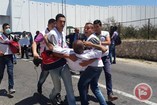
The Palestinian Journalists Syndicate has reported Saturday, that Israeli soldiers used excessive force against journalists marking World Press Freedom Day in Bethlehem, injuring the Syndicate’s head, and a member of its general assembly.
The journalists were marching ahead of the World Press Freedom day, celebrated every year on May 3, demanding an end to all violations, and crimes, against the media and journalists, and against the Palestinian people.
The two wounded journalists have been identified as Abdul-Nasser Najjar, the head of the Palestinian Journalists Syndicate, and its general assembly member Mohammad Lahham. The two were injured in their legs by Israeli concussion grenades.
The syndicate said the soldiers used excessive force against the journalists as they marched towards the northern entrance of Bethlehem, close to military roadblock #300.
The army also fired several gas bombs and concussion grenades, causing many Palestinians to suffer the effects of tear gas inhalation.
Najjar told the Radio Bethlehem 2000 that, by attacking journalists celebrating World Press Freedom Day, Israel is yet again showing the entire world it implements a systematic policy attempting to silence the media that exposes its daily crimes and violations.
“Despite all violations, all crimes, we have the duty and moral responsibility to expose all violations and crimes,” Najjar said, “We will ensure the huge file on Israeli violations reaches all related international and legal organizations.”
The journalists were marching ahead of the World Press Freedom day, celebrated every year on May 3, demanding an end to all violations, and crimes, against the media and journalists, and against the Palestinian people.
The two wounded journalists have been identified as Abdul-Nasser Najjar, the head of the Palestinian Journalists Syndicate, and its general assembly member Mohammad Lahham. The two were injured in their legs by Israeli concussion grenades.
The syndicate said the soldiers used excessive force against the journalists as they marched towards the northern entrance of Bethlehem, close to military roadblock #300.
The army also fired several gas bombs and concussion grenades, causing many Palestinians to suffer the effects of tear gas inhalation.
Najjar told the Radio Bethlehem 2000 that, by attacking journalists celebrating World Press Freedom Day, Israel is yet again showing the entire world it implements a systematic policy attempting to silence the media that exposes its daily crimes and violations.
“Despite all violations, all crimes, we have the duty and moral responsibility to expose all violations and crimes,” Najjar said, “We will ensure the huge file on Israeli violations reaches all related international and legal organizations.”

Israeli navy gunboats opened heavy machinegun fire at Palestinian fishing boats in Gaza sea Saturday morning.
Palestinian sources told Quds Press that a number of Israeli gunboats opened fire at the Palestinian fishing boats in Gaza sea and off the northern Gaza Strip coast.
The sources said that the heavy shooting was focused in al-Sudaniyah district in northern Gaza Strip and in Ejlin area to the west of Gaza city.
The fishermen were forced to return to shore due to intensive firing without completing their work. No casualties were reported among the fishermen, the sources added.
The gunfire attack is the latest in a series of breaches of the ceasefire agreement signed in Cairo last August between the Palestinian resistance and Israel.
Palestinian sources told Quds Press that a number of Israeli gunboats opened fire at the Palestinian fishing boats in Gaza sea and off the northern Gaza Strip coast.
The sources said that the heavy shooting was focused in al-Sudaniyah district in northern Gaza Strip and in Ejlin area to the west of Gaza city.
The fishermen were forced to return to shore due to intensive firing without completing their work. No casualties were reported among the fishermen, the sources added.
The gunfire attack is the latest in a series of breaches of the ceasefire agreement signed in Cairo last August between the Palestinian resistance and Israel.
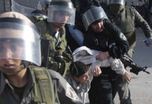
Israeli soldiers kidnapped, earlier Saturday, five Palestinians, including three children and a security officer, in the occupied West Bank, after breaking into homes and searching them, and kidnapped one Palestinian, on Friday evening.
Several military vehicles invaded the Tal Romeida neighborhood, in the southern West Bank city of Hebron, before violently searching and ransacking a number of homes.
The soldiers also kidnapped two children, identified as Nizar Nidal Salhab, 14, and ‘Awni ‘Ammar abu Shamsiyya, 15 years of age.
Israeli extremists of the Ramat Yeshai illegal outpost attacked the two children, before the soldiers arrived on the scene, and kidnapped them, instead of removing the assailing fanatics.
Another Palestinian identified as Thaer Mohammad ‘Amro, 22, was kidnapped after the soldiers stormed his home, and searched it, in Doura, south of Hebron.
Soldiers also installed a sudden roadblock on the Jericho road, and kidnapped a Palestinian security officer identified as Lieutenant Mohammad Yassin Kabaha, 37 years of age.
Kabaha, from Toura al-Gharbeyya village, west of the northern West Bank city of Jenin, was on his way to Jericho to participate in a special training course.
The soldiers also invaded Ya’bad town, west of Jenin, violently searched dozens of homes, used some rooftops as monitoring towers, and interrogated the families.
Other military units searched farmlands, and installed a roadblock leading to the villagers’ orchards.
In Bethlehem, local youths clashed with soldiers invading Jabal al-Mawaleh area, and threw a Molotov cocktail on one of the military vehicles.
The soldiers tried to ambush the protesters, but withdrew after failing to kidnap any of them.
In addition, soldiers invaded ‘Ailet ‘Ali area, east of Bethlehem, and handed one Palestinian, identified as Ahmad Ibrahim Ali, 30 years of age, a military warrant for interrogation in the Etzion military base.
The army also invaded Bethlehem city, searched a number of homes, and handed a similar order to ‘Issa Nader Saleh, 18.
In addition, Israeli soldiers said they arrested a Palestinian teen, “after attempting to stab a soldier”, at the Tunnel Roadblock, south of occupied Jerusalem.
The Israeli Radio said the teenager “raised a knife and tried to stab a soldier, before he was subdued.”
The unidentified teen was moved to an Israeli military center for interrogation, the Israeli Radio added.
On Friday evening, soldiers invaded Wad al-Jouz neighborhood, in occupied Jerusalem, and clashed with local youths before kidnapping one Palestinian, identified as Mohannad Saharabati, 19 years of age, near Abdin Mosque.
Several military vehicles invaded the Tal Romeida neighborhood, in the southern West Bank city of Hebron, before violently searching and ransacking a number of homes.
The soldiers also kidnapped two children, identified as Nizar Nidal Salhab, 14, and ‘Awni ‘Ammar abu Shamsiyya, 15 years of age.
Israeli extremists of the Ramat Yeshai illegal outpost attacked the two children, before the soldiers arrived on the scene, and kidnapped them, instead of removing the assailing fanatics.
Another Palestinian identified as Thaer Mohammad ‘Amro, 22, was kidnapped after the soldiers stormed his home, and searched it, in Doura, south of Hebron.
Soldiers also installed a sudden roadblock on the Jericho road, and kidnapped a Palestinian security officer identified as Lieutenant Mohammad Yassin Kabaha, 37 years of age.
Kabaha, from Toura al-Gharbeyya village, west of the northern West Bank city of Jenin, was on his way to Jericho to participate in a special training course.
The soldiers also invaded Ya’bad town, west of Jenin, violently searched dozens of homes, used some rooftops as monitoring towers, and interrogated the families.
Other military units searched farmlands, and installed a roadblock leading to the villagers’ orchards.
In Bethlehem, local youths clashed with soldiers invading Jabal al-Mawaleh area, and threw a Molotov cocktail on one of the military vehicles.
The soldiers tried to ambush the protesters, but withdrew after failing to kidnap any of them.
In addition, soldiers invaded ‘Ailet ‘Ali area, east of Bethlehem, and handed one Palestinian, identified as Ahmad Ibrahim Ali, 30 years of age, a military warrant for interrogation in the Etzion military base.
The army also invaded Bethlehem city, searched a number of homes, and handed a similar order to ‘Issa Nader Saleh, 18.
In addition, Israeli soldiers said they arrested a Palestinian teen, “after attempting to stab a soldier”, at the Tunnel Roadblock, south of occupied Jerusalem.
The Israeli Radio said the teenager “raised a knife and tried to stab a soldier, before he was subdued.”
The unidentified teen was moved to an Israeli military center for interrogation, the Israeli Radio added.
On Friday evening, soldiers invaded Wad al-Jouz neighborhood, in occupied Jerusalem, and clashed with local youths before kidnapping one Palestinian, identified as Mohannad Saharabati, 19 years of age, near Abdin Mosque.
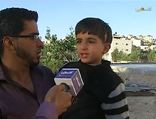
Still Image From Palestine TV Video Report
Army Fires Gas Bombs Into Homes
Israeli soldiers invaded, Friday, Silwad town, east of the central West Bank city of Ramallah, clashed with local youths, and deliberately fired gas bombs into several homes; many injured, including three Palestinians who were shot with live rounds.
The soldiers invaded the town, and assaulted several children and women, beating them on various parts of their bodies, mainly on their heads, backs and shoulders, causing cuts and bruises.
A Palestinian child told Palestine TV reporter Ali Dar Ali that the soldiers fired a gas bomb into his family’s home, forcing the family to run out of its property to avoid suffocation.
Minutes later, the soldiers surrounded the home, but were forced to run away after dozens of local youths hurled stones on them; the soldiers fired several gas bombs, but local protesters threw the bombs back, forcing the soldiers to retreat.
Clashes took place in various parts of the town, and the soldiers fired dozens of rounds of live ammunition, rubber-coated metal bullets, concussion grenades and gas bombs.
During the clashes, Israeli soldiers shot and inured three Palestinians with live rounds, and many others with rubber-coated metal bullets, while many suffered the effects of tear gas inhalation.
One soldier was mildly injured in his face after being struck by a stone thrown by a local protester.
Silwad witnesses repeated Israeli military invasions and violations, and is a scene of repeated clashes between the invading soldiers and local residents.
Army Fires Gas Bombs Into Homes
Israeli soldiers invaded, Friday, Silwad town, east of the central West Bank city of Ramallah, clashed with local youths, and deliberately fired gas bombs into several homes; many injured, including three Palestinians who were shot with live rounds.
The soldiers invaded the town, and assaulted several children and women, beating them on various parts of their bodies, mainly on their heads, backs and shoulders, causing cuts and bruises.
A Palestinian child told Palestine TV reporter Ali Dar Ali that the soldiers fired a gas bomb into his family’s home, forcing the family to run out of its property to avoid suffocation.
Minutes later, the soldiers surrounded the home, but were forced to run away after dozens of local youths hurled stones on them; the soldiers fired several gas bombs, but local protesters threw the bombs back, forcing the soldiers to retreat.
Clashes took place in various parts of the town, and the soldiers fired dozens of rounds of live ammunition, rubber-coated metal bullets, concussion grenades and gas bombs.
During the clashes, Israeli soldiers shot and inured three Palestinians with live rounds, and many others with rubber-coated metal bullets, while many suffered the effects of tear gas inhalation.
One soldier was mildly injured in his face after being struck by a stone thrown by a local protester.
Silwad witnesses repeated Israeli military invasions and violations, and is a scene of repeated clashes between the invading soldiers and local residents.
1 may 2015
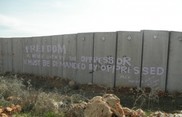
Israeli forces have, at the time of this report, fired at least 45 tear gas grenades towards the village of Ni'lin, west of Ramallah. Many suffer from severe inhalation.
Residents of Ni'lin, with international activists, have been staging weekly demonstrations against a nearby expansion of the Israeli West Bank barrier, the PNN reports. It has been estimated that the completion of the barrier will remove ⅓ of Ni'lin's land.
Protests recently began to take palce against the building on village farmland within a small stretch of the barrier which will place 2,500 dunams (250 hectares) of Ni'lin farmland on the Israeli side, an area of the occupied West Bank which has been used to build several illegal Jewish-only settlements, including Hashmoniim. Two other settlements, Nili and Na'ale, have also been built to the east of the village and the people of Ni'lin fear that they will soon be surrounded and cut off. All settlements in the occupied territories are illegal under international law.
"Our land will be divided into small cantons," said Salah Khawaja before the latest Israeli military operations. Khawaja, age 40, is one of the village protest organizers, and works as an administrator in a medical organization.
"People in this area were totally dependent on agriculture but now they are imposing a transfer and migration policy on us in a very harsh way. Everyone can see the quantity and quality of land they are going to confiscate," he said.
In 1948, at the time of the creation of the state of Israel, the village had around 57,000 dunams of land, according to Khwaja. It now consists of around 10,000 dunams and will have even fewer when the latest part of the barrier is finished.
Residents of Ni'lin, with international activists, have been staging weekly demonstrations against a nearby expansion of the Israeli West Bank barrier, the PNN reports. It has been estimated that the completion of the barrier will remove ⅓ of Ni'lin's land.
Protests recently began to take palce against the building on village farmland within a small stretch of the barrier which will place 2,500 dunams (250 hectares) of Ni'lin farmland on the Israeli side, an area of the occupied West Bank which has been used to build several illegal Jewish-only settlements, including Hashmoniim. Two other settlements, Nili and Na'ale, have also been built to the east of the village and the people of Ni'lin fear that they will soon be surrounded and cut off. All settlements in the occupied territories are illegal under international law.
"Our land will be divided into small cantons," said Salah Khawaja before the latest Israeli military operations. Khawaja, age 40, is one of the village protest organizers, and works as an administrator in a medical organization.
"People in this area were totally dependent on agriculture but now they are imposing a transfer and migration policy on us in a very harsh way. Everyone can see the quantity and quality of land they are going to confiscate," he said.
In 1948, at the time of the creation of the state of Israel, the village had around 57,000 dunams of land, according to Khwaja. It now consists of around 10,000 dunams and will have even fewer when the latest part of the barrier is finished.
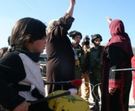
Israeli soldiers attacked, Friday, the weekly protest in the al-Ma’sara village, in the West Bank district of Bethlehem.
Eyewitnesses said the soldiers prevented the nonviolent protesters from reaching Palestinian lands and orchards Israel illegally annexed to expand its colonies, and isolated behind the Wall.
The protesters marched, marking May 1, the International Workers Days, and were accompanied by several international peace activists.
The protest started in the center of the village, before the protesters marched while chanting for the liberation of Palestine, the rights of workers, and an end to Israel’s ongoing and escalating violations.
The army used excessive force against the nonviolent protesters, and prevented them from reaching the isolated Palestinian orchards.
The Popular Committee in al-Ma’sara said the protests, the nonviolent struggle, will continue until the liberation of Palestine.
Al-Ma’sara village is one of many villages in the occupied West Bank that hold weekly protests against Israel’s illegal Annexation Wall and settlements, isolating the villagers from their lands and orchards.
Eyewitnesses said the soldiers prevented the nonviolent protesters from reaching Palestinian lands and orchards Israel illegally annexed to expand its colonies, and isolated behind the Wall.
The protesters marched, marking May 1, the International Workers Days, and were accompanied by several international peace activists.
The protest started in the center of the village, before the protesters marched while chanting for the liberation of Palestine, the rights of workers, and an end to Israel’s ongoing and escalating violations.
The army used excessive force against the nonviolent protesters, and prevented them from reaching the isolated Palestinian orchards.
The Popular Committee in al-Ma’sara said the protests, the nonviolent struggle, will continue until the liberation of Palestine.
Al-Ma’sara village is one of many villages in the occupied West Bank that hold weekly protests against Israel’s illegal Annexation Wall and settlements, isolating the villagers from their lands and orchards.
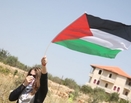
Israeli soldiers attacked, Friday, the weekly nonviolent protest against the illegal Annexation Wall and settlements, in Bil’in village near the central West Bank city of Ramallah, causing many injuries; army fire also burnt olive orchards.
The protest peacefully started in the center of the village, following Friday prayers, and the protesters marched chanting against the illegal Israeli occupation of Palestine, the annexation Wall, Israel’s colonies and ongoing violations.
The protesters carried Palestinian flags and signs, and chanted for the rights of all workers, as May 1, the International Workers’ Day, is widely marked by the Palestinians each year.
Similar to all previous protests, dozens of Israeli and international peace activists participated in the march, and were violently assaulted by the soldiers.
The Popular Committee against the Wall and Settlement in Bil’in has reported that a Spanish peace activist was shot by an Israeli gas bomb directly to the shoulder, and received treatment by Palestinian medics.
The army fired dozens of gas bombs and concussion grenades, causing many injuries, while several olive orchards caught fire due to the Israeli army fire.
The burnt orchards belong to two Palestinians, identified as Ashraf al-Khatib, and Mahmoud al-‘Abed Yousef.
The Popular Committee said the soldiers also invaded the western area of the village, and clashed with dozens of local youths.
It expressed its solidarity with all Palestinian workers, subject to ongoing violations and assaults, carried out by Israeli soldiers and extremist settlers.
The committee affirmed the Palestinians, along with their Israeli and international supporters, will continue their struggle for liberation and independence.
The protest peacefully started in the center of the village, following Friday prayers, and the protesters marched chanting against the illegal Israeli occupation of Palestine, the annexation Wall, Israel’s colonies and ongoing violations.
The protesters carried Palestinian flags and signs, and chanted for the rights of all workers, as May 1, the International Workers’ Day, is widely marked by the Palestinians each year.
Similar to all previous protests, dozens of Israeli and international peace activists participated in the march, and were violently assaulted by the soldiers.
The Popular Committee against the Wall and Settlement in Bil’in has reported that a Spanish peace activist was shot by an Israeli gas bomb directly to the shoulder, and received treatment by Palestinian medics.
The army fired dozens of gas bombs and concussion grenades, causing many injuries, while several olive orchards caught fire due to the Israeli army fire.
The burnt orchards belong to two Palestinians, identified as Ashraf al-Khatib, and Mahmoud al-‘Abed Yousef.
The Popular Committee said the soldiers also invaded the western area of the village, and clashed with dozens of local youths.
It expressed its solidarity with all Palestinian workers, subject to ongoing violations and assaults, carried out by Israeli soldiers and extremist settlers.
The committee affirmed the Palestinians, along with their Israeli and international supporters, will continue their struggle for liberation and independence.
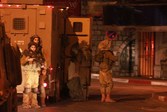
The Israeli Occupation Forces (IOF) carried out at dawn Friday a large-scale raid and search campaign in Beit Furik town to the east of Nablus, and Fardies village in Nablus.
A number of Israeli military vehicles stormed in large numbers Beit Furik town since the early morning hours and violently broke into a number of local homes, eyewitnesses told PIC reporter.
Few hours later, the Israeli forces withdrew from the town towards Itmar settlement built illegally on Palestinian lands in the town.
Along the same line, IOF raided at dawn today Fardies town to the east of Bethlehem and handed over a young man a summons order.
The 32-year-old Yacub Asakereh was summoned for interrogation in Ghush Etizon settlement bloc to the south of Bethlehem after IOF brutally stormed his home.
Meanwhile, IOF arrested overnight a Palestinian youth from Silat Harthiya town in Jenin at Karama border crossing that links between Jordan and occupied West Bank.
Local sources confirmed that Abdel Raouf Khabas, 23, was detained at Karama crossing while in his way to Jordan. He was taken to an Israeli investigation center.
A number of Israeli military vehicles stormed in large numbers Beit Furik town since the early morning hours and violently broke into a number of local homes, eyewitnesses told PIC reporter.
Few hours later, the Israeli forces withdrew from the town towards Itmar settlement built illegally on Palestinian lands in the town.
Along the same line, IOF raided at dawn today Fardies town to the east of Bethlehem and handed over a young man a summons order.
The 32-year-old Yacub Asakereh was summoned for interrogation in Ghush Etizon settlement bloc to the south of Bethlehem after IOF brutally stormed his home.
Meanwhile, IOF arrested overnight a Palestinian youth from Silat Harthiya town in Jenin at Karama border crossing that links between Jordan and occupied West Bank.
Local sources confirmed that Abdel Raouf Khabas, 23, was detained at Karama crossing while in his way to Jordan. He was taken to an Israeli investigation center.
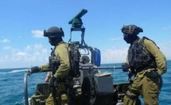
Israeli navy ships opened fire, on Friday morning, on a number of Palestinian fishing boats in Gaza territorial waters, causing property damage.
The navy targeted the boats near Gaza city, causing excessive damage but no injuries, eyewitnesses said.
The fishers were within the allotted four nautical miles, some even closer to the shore, when the navy ships attacked their boats, and opened fire on them.
The navy conducts ongoing assaults and violations against the fishers, preventing them from providing daily livelihoods to their families. The attacks led to many deaths, dozens of injuries and arrests.
Israel fires at Gaza fishermen, nabs youth on way to seek livelihood
The Israeli occupation navy on Friday opened heavy machinegun fire at Palestinian fishing vessels off the Gaza coast, just a few hours before a Palestinian youth was kidnapped by the Israeli army near the border fence.
Media sources said the Israeli occupation warships unleashed spates of machinegun fire on a fleet of sihing vessels off the Gaza waters, resulting in remarkable material damage. No injuries have been reported so far.
The same sources said there were no identifiable reasons for the random fire shooting as the fishermen were sailing within less than four nautical miles.
The attack represents another episode in the series of Israeli violations of the Cairo-brokered truce accord signed in the wake of last-summer’s Israeli offensive on the besieged coastal enclave. Ever since, the Israeli occupation has reportedly been marring the lives of Gaza’s fishermen, who put out to sea to earn a living for their starved children.
In a separate incident, earlier overnight on Thursday, the Israeli occupation army claimed responsibility for the abduction of a Palestinian youngster as he tried to infiltrate into an Israeli-controlled Kibbutz in the region of Eshkol, to the south of Gaza.
The Israeli soldiers dragged the detainee to the Shabak detention center, pending further investigation.
Infiltrations into Israeli-run areas have been on the rise due to the high unemployment and poverty rates rocking the blockaded coastal enclave.
The navy targeted the boats near Gaza city, causing excessive damage but no injuries, eyewitnesses said.
The fishers were within the allotted four nautical miles, some even closer to the shore, when the navy ships attacked their boats, and opened fire on them.
The navy conducts ongoing assaults and violations against the fishers, preventing them from providing daily livelihoods to their families. The attacks led to many deaths, dozens of injuries and arrests.
Israel fires at Gaza fishermen, nabs youth on way to seek livelihood
The Israeli occupation navy on Friday opened heavy machinegun fire at Palestinian fishing vessels off the Gaza coast, just a few hours before a Palestinian youth was kidnapped by the Israeli army near the border fence.
Media sources said the Israeli occupation warships unleashed spates of machinegun fire on a fleet of sihing vessels off the Gaza waters, resulting in remarkable material damage. No injuries have been reported so far.
The same sources said there were no identifiable reasons for the random fire shooting as the fishermen were sailing within less than four nautical miles.
The attack represents another episode in the series of Israeli violations of the Cairo-brokered truce accord signed in the wake of last-summer’s Israeli offensive on the besieged coastal enclave. Ever since, the Israeli occupation has reportedly been marring the lives of Gaza’s fishermen, who put out to sea to earn a living for their starved children.
In a separate incident, earlier overnight on Thursday, the Israeli occupation army claimed responsibility for the abduction of a Palestinian youngster as he tried to infiltrate into an Israeli-controlled Kibbutz in the region of Eshkol, to the south of Gaza.
The Israeli soldiers dragged the detainee to the Shabak detention center, pending further investigation.
Infiltrations into Israeli-run areas have been on the rise due to the high unemployment and poverty rates rocking the blockaded coastal enclave.
